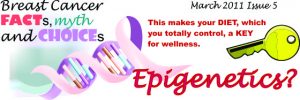The epigenetics of cancer is an exiting field. This is partly because one no longer needs to adopt a fatalistic attitude to tumorigenesis. Its known that many epigenetic changes are reversible, and by definition, are NOT due to direct changes in DNA sequence even though they impact gene expression.
There are many BIOACTIVE agents in our diet, i.e. molecules which actually regulate epigenetic events involved in tumorigenesis. BIOACTIVE dietary components impact epigenetic targets in cancer prevention and therapy as well.
Researchers have shown that some of these dietary agents are: curcumin (turmeric), genistein (soybean), tea polyphenols (green tea), resveratrol (grapes), and sulforaphane (cruciferous plants – cabbage, cauliflower, bok choy, and broccoli). The latter may be quite important in prostate cancer cells.
The BIOACTIVE compounds can alter the methyl groups on DNA and the changes in histones (see pictures in ISSUE 4) and in doing so influence some tumor-suppressor and tumor-promoting processes. This makes your DIET, which you totally control, a KEY for wellness.
1. Meeran SM, Ahmed A, Tollefsbol TO. Epigenetic targets of bioactive dietary components for cancer prevention and therapy. Clin Epigenetics 2010 Dec; 1: 101-116. http://www.ncbi.nlm.nih.gov/pubmed/21258631
2. http://en.wikipedia.org/wiki/Cruciferous_vegetables (a great list)
3. Hien T. Le , Charlene M. Schaldach , Gary L. Firestone ¶ and Leonard F. Bjeldanes. Plant-derived 3,3′-Diindolylmethane Is a Strong Androgen Antagonist in Human Prostate Cancer CellsJ. Biol. Chem., Vol. 278, Issue 23, 21136-21145, June 6, 2003.
